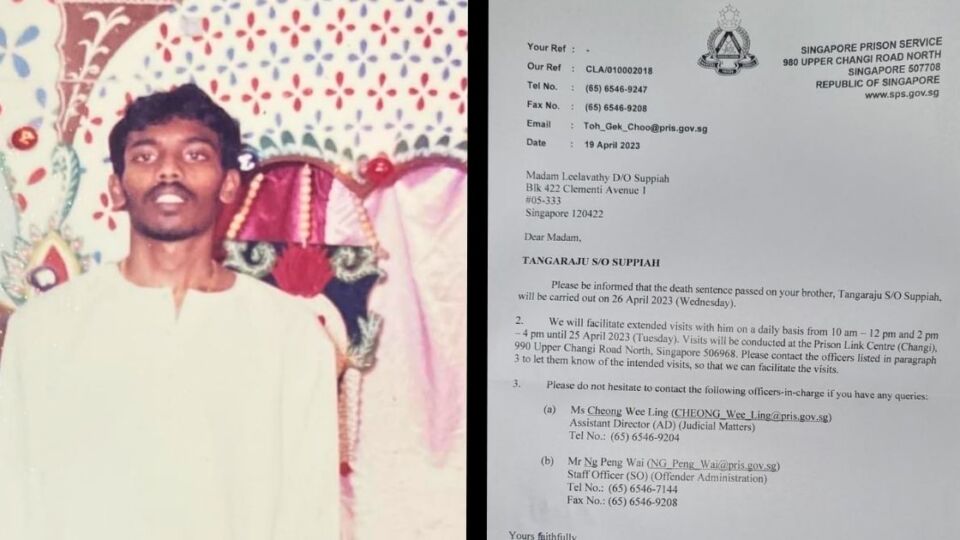Several activists involved in the anti-death penalty movement in Singapore announced this afternoon that the family of Tangaraju Suppiah — a Singaporean man of Tamil descent who was found guilty of conspiracy to traffic approximately 1kg of cannabis in 2017 — has been notified that he will be executed on next Wednesday (April 26)
The Singaporean government does not publicly announce upcoming executions. Activists usually learn about them when the government notifies the family of the inmate one week before the date of their hanging. In this case, they learned about the news from Tangaraju’s sister.
This is the execution notice that was delivered to Tangaraju’s sister Leela today. Tangaraju and his family need all the solidarity and support they can get to halt this imminent execution in #Singapore. pic.twitter.com/8pZ23zW1VT
— Kirsten Han 韩俐颖 (@kixes) April 19, 2023
Tangaraju was charged and convicted of conspiracy to traffic drugs because the court found that he was the owner of the two phone numbers contacted by Mogan Valo, the person police found in possession of 1017.9g marijuana.
Tangaraju never touched the drugs he is scheduled to be hanged for next week. But prosecutors argued that he had been the intended recipient of the drugs, which Tangaraju denied. You can read the court’s full decision in that case here.
Under Singapore’s harsh drug laws, a mandatory death sentence is given to anybody found guilty of trafficking over 500 grams of marijuana. Abetting the trafficking of drugs carries the same legal weight.
Kirsten Han and Kokila Annamalai, both members of the Transformative Justice Collective, a group that advocates for the abolishment of the death penalty, highlighted a number of issues activists have with the prosecution’s case.
One is that Tangaraju claimed that he had asked for a Tamil interpreter for the recording of his statements, but was not provided with one. Like most criminal suspects in Singapore, he was interrogated by the police without the presence of a lawyer and the prosecution relied on a statement he gave to an inspector, without counsel, to get their conviction.
Although he did not have the representation of a lawyer, Tangaraju filed a criminal motion by himself in December seeking to have his conviction reviewed due to a change in the law regarding prosecutors’ disclosure of material witness statements to the defence. His motion was denied (you can read the full judgment here).
Tangaraju was also part of a lawsuit filed last year by 24 death row inmates that argued their access to lawyers for appeals and reviews of their cases was being obstructed by the courts’ ability to impose costs on defence lawyers for cases deemed to be frivolous or an abuse of process, which made them afraid to take up the legal challenges. That lawsuit was struck down.
Singapore executed 11 people in 2022, mainly for drug-related offenses. The series of executions led to a growing outcry from activists, both local and international, as well as international organizations such as the EU and the United Nations, calling for the city-state to abolish its death penalty policy.
But the Singaporean government has vehemently defended the necessity of its death penalty policy, arguing that it is essential to protecting its citizens from the scourge of drugs.




